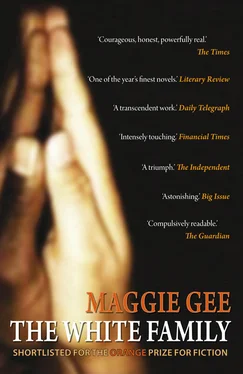‘I’m not a foreigner. Now, are you OK?’ He was putting her brush back into her handbag, and her mirror, and her shamefully hair-clotted comb. ‘Where shall I put this money?’
She took it from him, humbly, and thrust it back to the very bottom of her ancient bag. ‘You’re very kind. Very kind. I don’t know how to say thank you —’
‘That’s all right. Have you got everything?’
Six feet away she suddenly saw the carrier-bag from the off-licence. When she picked it up it clinked suspiciously. Peeping inside, she saw golden liquid and pieces of glass. ‘My bottles have broken.’
‘That’s a pity.’
She realized at once he would think she was a drinker, and had fallen through drink, so she started again: ‘They’re for my husband, not for me, it’s to cheer him up in hospital …’
‘I’ve got to be off, now.’
‘What’s your name?’ she said, suddenly. ‘My name is May. I’m very grateful.’ And then, impelled by an obscure impulse, but also because she felt it was true, ‘My husband would be very grateful to you. For looking after me. He would.’
‘Winston,’ he said. His smile was self-mocking. ‘That’s not a foreigner’s name, is it?’ But he looked as though it embarrassed him. She thought about Dirk, suddenly. Maybe kids never like the names we give them .
‘No,’ she said, so as not to be rude, but inside she reflected that it was. No English people called their sons Winston, though Winnie himself was English, of course. It was only Americans, and blacks. Why were they more patriotic than us? ‘Thank you, Winston. I’ll remember you. I’ll tell my daughter about you.’
‘You say “Hello” to her for me.’
There was something very boyish in his manner, his dancing smile, his soft intonations. ‘I will,’ said May. She didn’t know what to say. She was almost two feet smaller than him, but she realized, now, that he was very slender, and his eyes were gentle, rather shy. He looked exotic, and faintly out of place, outlined against the grim metal grille where Freddie’s Flowers had once flourished. It was cold, in Britain, and hard, and grey. ‘Take care,’ she said, rather foolishly, for it was she who was falling about, she who was breaking and losing things and imagining muggers and talking rubbish. She frowned up, trying to take him in, wondering why she had only just seen him. And then he was gone. ‘Take care, Winston.’
Shirley felt happy, gliding down on the escalator. God-like, swooping down over the world, a world that was made entirely good, light years away from the world of her childhood.
She hoped she wasn’t being blasphemous. Shirley rendered to God and rendered to Mammon. She put the notes in the plate every Sunday, sometimes brown ones, usually blue ones. She didn’t do as well as Elroy, of course. Elroy paid tithes to the Paddington Temple, one-tenth of his income, before tax, not after, which she thought was too much, and told him so, quite early on in their relationship.
‘It’s better to give than receive,’ he’d said to her. ‘I’m surprised at you, Shirley.’
‘My church feels you should give as you want. Your way is like income tax.’
‘But my way means they get a lot more money.’
‘I know. But Elroy, you’re not rich.’
‘God will bless me. I got enough, woman. I try to give to you, but you say you don’t need it —’
She went and put her arms around him. He was a proud man, easily hurt, and he wasn’t comfortable with her having money, especially since it came from Kojo. ‘You’re very good to me. I just worry … It’s as if they’re too interested in your money.’
‘Maybe you don’t like my church,’ he said. ‘Maybe you don’t like black people’s church.’
‘But I’ve said I’ll go with you every other week — I’m sorry. Let’s not argue about it.’ And they did go together on alternate Sundays, to Paddington Temple and St John’s in Piccadilly, where she had worshipped for sixteen years, since she lost her baby and had her breakdown.
She’d tried very hard to respect his church, although it was so different from what she was used to. But only last month May had come to tea and made the subject of church more fraught.
Shirley was out in the kitchen, getting out the cake-plates, and Elroy was taking off his coat in the hall. He had just come in, tired from work. May was pleased to see Shirley’s ‘new young man’; she had only met him half-a-dozen times. Elroy was pleased to see her, as well, though he remained wary; did she really like him? ‘Mum does like you,’ Shirley had told him, ‘because you are young and nice-looking. And not being Dad, you can’t boss her about.’
May picked up a booklet, Paddington Temple: Impacting the City , which Elroy had left lying on the dining-room table. ‘ Impacting the City . What does that mean? Sounds like a bomb. Or a wisdom tooth.’
Shirley didn’t always listen to her mother, and Elroy was complaining about his hospital, which had all gone downhill since it became a Trust. ‘Seems like everything is rule by money … Last year the cleaning is privatize, this month they put the catering out to tender, and our people lose it because their bid is two thousand pound higher than the other … Two thousand lousy pound! In a budget of millions! And now they’re telling me this new lot is saying they can feed a man for seven pound a week. OK, right, if they feed them rubbish —’
‘That’s terrible,’ Shirley said. She knew he was upset. When he was upset he sounded more Jamaican. She was trying to listen, as she opened the oven.
But her mother was waffling unstoppably on. ‘This isn’t English. It’s American. Discipling the Church to Impact the City . Disciple is a noun, not a verb. Shirley never did care enough about English. Kingdom Economics? What is that?’
Elroy was suddenly listening to her. ‘It’s about giving, Mrs White,’ he said. Shirley knew she must shut her mother up, but she was trying to lift the sponge from the cake-tin without leaving half of it behind, and her face was too hot, and the gas was roaring.
‘This bit is a scream,’ Mum was saying. ‘“ Question . Do I have to tithe on my gross or net income? Answer . That depends on whether you want to be blessed on your gross or net income.” Surely you don’t believe that, Shirley? Are you listening, dear? I’m talking to you. I mean, God isn’t an accountant, is he, sitting up there working out how much to bless you?’
‘ Mum . That’s Elroy’s. Don’t be rude.’
Elroy was bright, but not quick with words. He sat there pretending he didn’t mind. ‘Never mind Shirley. Just leave it.’
‘Oh dear, Elroy. Have I put my foot in it?’ Mum blushed red; she was quite crestfallen.
‘Yes,’ Shirley said. ‘You have. Well done.’
He drove her to the underground, and when he came back he said no more about it, but the next Sunday — two Sundays ago — the day before Dad had his event — they got up as usual to go to church, and it was his church’s turn, they were going to Paddington Temple, but Elroy suddenly said, as he put on his tie, ‘We better go each to our own.’
‘What do you mean?’
‘We don’t have to worship together.’
‘I know we don’t. But you like us to.’
‘Your mother thought our church was a joke.’
‘Oh Mum. What does she know? It was just the booklet. She’s always been like that. She laughs at things.’
‘The fear of the Lord is the beginning of wisdom.’
‘Oh lay off, Elroy. My mother is my mother — God would understand her.’
‘I don’t want no one to mock my faith.’ It was said with a wealth of bitterness, it was not about her, or Mum, or now, it was about all the times that Elroy had been mocked, because he was black, or because they were poor.
Читать дальше












